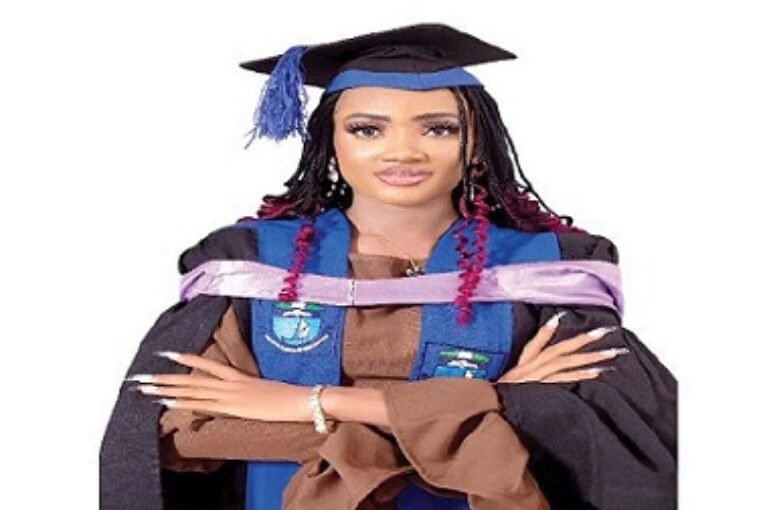
Miracle Uche, a 24-year-old from Abia State, speaks to TEMITOPE ADETUNJI about her childhood, growing up in a tailoring family, and how she navigated challenges to graduate with a first-class degree in Animal and Environmental Biology from the University of Port Harcourt
What was growing up like for you?
I grew up in a family of six – five girls and one boy. I’m the last child of my parents, who are still alive. My father is a tailor in the city of Aba; he specializes in sewing school uniforms, and my mother assisted in his business.
I started sewing when I was in JSS 3, at the age of 13. My siblings and I grew up assisting my father in the business during weekends, public holidays, mid-term breaks, and end-of-session breaks.
Are there any early influences from your upbringing that shaped your academic values?
Yes, my father loves education and values quality education. He did not have it all but made sure we all attended one of the best primary and secondary schools in Aba. He would collect jobs from the school and use them in exchange for our tuition. Going to a good primary and secondary school created a solid foundation for me.
What’s one vivid memory you have of working in your father’s tailoring shop?
There was a particular job he got, and we were behind schedule due to the quantity. We had to work morning, afternoon, and night just to deliver. We slept a maximum of four hours in 24 hours. It was stressful, but it made me strong.
Did sewing as a child ever make you feel different from your peers?
Yes, I felt different. My peers would be attending summer classes and extra lessons, and I would be on my way to the shop. It got to me after senior WAEC when everyone around me was going for UTME classes, and I was going to the shop every day. I only studied for the exam at night.
Did your parents have any specific expectations for your education?
My parents were not really interested in good grades. They both ended their education at the primary level, so they didn’t understand what those grades meant. I can remember the first time I brought an award home in my primary school days, and my father’s exact words were, ‘I didn’t know you were this intelligent.’ They were interested in making us industrious but, at the same time, wanted good education for us.
Were you always a brilliant student, or was it something you worked your way up to?
I was always a brilliant student from primary school to university level, but I worked hard to keep up and maintain the position.
What inspired your choice of Animal and Environmental Biology as a course?
My inspiration was tied to my inquisitive nature — the biology behind every living thing and their response to the environment. It is something worth studying and understanding. Have you ever wondered why mosquitoes bite at night or in a dark setting? Or why some particular insecticides don’t kill mosquitoes anymore within a specific environment? All those questions led me to accept studying Animal and Environmental Biology.
Was it your first choice in JAMB? If not, how did you come to love the course?
It was not my first choice in JAMB. I developed passion and love for the course in my 200 level when I started noticing a lot of environmental factors that are causing harm to man and his health. To take mitigation measures, we need to understand the causes and impact. There’s a lot happening in the environment — in water, the atmosphere, and on land — that man is not aware of.
Animal and Environmental Biology is so broad that it was divided into options: the animal physiology option, hydrobiology and fisheries option, environmental biology option, and entomology option.
What was your academic journey like at the University of Port Harcourt?
I gained admission in 2019, experienced a COVID break and ASUU strike twice. My academic journey was filled with energy, stress, and fulfillment. I made sure I participated in extracurricular activities. I took leadership roles every session, either in church, the department, or the student union.
I made friends with like minds, and I took digital skill courses at the end of every session. I made sure I learnt one skill or perfected the one I already knew before the start of a new session. But then, I had zero social life; I never went for social gatherings like parties, etc.
Also, I ran small businesses in school. In my 1st year, I sold oil perfumes in classes and hostels. In 2nd year, I added data subscriptions (I was a data vendor), and that particular business gave me my first N100,000 at the age of 20. During my second-year session break, I took a content writing course, and in my third year, I got a long-term deal for content writing.
In my fourth year, which was my final year, the workload became overwhelming. I had to quit the writing gig and focus on my schoolwork. The only job I did in my fourth year was data analysis for project research. I learned data analysis during my 3rd-year session break.
Were there times you felt like giving up during your academic pursuit?
Yes, I felt like giving up after my second-year first semester due to the long ASUU strike. The strike was really a setback for me, and it kept me at a T-junction. I needed to save money for the next semester, and nobody wanted to employ an undergraduate. It was so frustrating that I almost abandoned the degree to get another degree from a school of nursing — at least they (lecturers) don’t go on strike.
What were your lowest moments in school, and how did you overcome them?
I won’t say I never experienced a lowest moment, but I saw it all as a mirage. The financial crisis, eating one square meal a day, the poor-quality food, trekking under the hot sun just so I could have funds to do the important things — they were all a mirage for me.
What study habits or techniques worked best for you?
I started studying from the beginning of the semester to avoid accumulating courses. I preferred to study alone rather than in a group. Before I start studying, I make sure I have had enough sleep.
If I were able to sleep in the morning, I could study throughout the afternoon. I could study in the morning, afternoon, or night, depending on when I had my good sleep. Sleep helped relax my eye and brain muscles.
Was your first class planned or a surprise?
My first class was planned. I started working towards it from my first year.
Beyond the academics, what else did you do while on campus?
I held leadership positions such as SUG barrister under the judiciary arm, departmental member of the jury, general secretary of my church fellowship for two sessions, and financial secretary of my church fellowship for one session.
I also volunteered at tech events in Port Harcourt when I started my tech journey as a data analyst. I had a small business.
How did you balance social life and academic excellence?
I never had a social life; it was just school, church, and my business.
Who would you say played the biggest role in your success story?
My elder sister and her husband, Mr and Mrs Chukwuma Ama, play the biggest role in my success.
Were there lecturers, mentors, or friends who made a difference in your academic journey?
Yes! Prof. Noutcha Aline, Dr. Maduamaka Abajue, and Dr. Ndubisi were the lecturers who kept encouraging me during my weak days. My friend, Mr. Stephen Egbochuo, held my hand from my first year to my fourth year; he stood in as my emotional support.
Did you ever struggle with finances, emotional stress, or health during your academic years?
Yes, I struggled with finances, emotional stress, and health. For health, the school clinic handled it adequately. I had a friend who was always available to ease the emotional stress. Amid the financial assistance I got from home and my little digital gigs, there were still times of financial struggle, but I was able to manage them through adequate financial planning and spending.
I started my financial management at the beginning of the semester, not when the money was almost halfway gone or about to finish. I planned every expense — down to money for pens. I could calculate how many pens would be enough for me in a semester and buy them at once at a discounted price.
I calculated how many sachets of water I drank in a week and bought enough for two to three months at wholesale price. A semester was three months and two weeks, or a maximum of four months, depending on the exam timetable. So, I calculated all my expenses and bought in bulk at wholesale price.
I never did PoS withdrawals because those N100 charges were a lot for me. I dedicated a day to withdraw from the bank the amount of money that would be enough for me for a month. I saved aggressively! I would even starve myself just to save money because of unforeseen needs.
What was the hardest decision you had to make as a student?
The hardest decision I made was to come back to UNIPORT after I went to the School of Nursing due to the ASUU strike. My coursemates were already two weeks away from semester exams. It was a tough decision for me because I knew it was late, and I recorded my worst semester results in that semester — 2 A’s, 2 B’s, 2 C’s, and 1 D. But I braced myself because the worst result was someone else’s prayer answered.
How did you handle peer pressure, distractions, or the weight of expectations?
I made friends with like-minded people who had the same vision as I did, and people in my social class. So, there was no form of pressure. We were all struggling to make good grades and eat at least twice a day.
What’s your message to other students who are struggling to find motivation?
My motivation was my siblings. They paid my tuition not because they had enough but because they didn’t want me to experience what they experienced. They wanted to give me a little bit of freedom to focus more on academics than they did, and I’m glad I was able to make them proud as the only first-class graduate among six graduates. Their money was not wasted.
So, my message for students struggling to find motivation is to look at the people struggling to pay their tuition; they are surely waiting to blow your trumpet at the end of the race. Even if you’re sponsoring yourself, you’re going to be the proudest human being on earth if you pull through.
What are your plans after graduation — career path, NYSC, further studies?
I graduated this year, 2025. I am yet to serve. With my background in data and business analytics, I am looking forward to pre-NYSC internship positions in consulting firms where I would be able to apply my skills, grow, and learn more in a dynamic, impact-driven environment.
Do you intend to pursue a master’s degree or move into industry?
I intend to move into industry to gain more hands-on experience before pursuing my master’s.
What’s one fun fact about you that people wouldn’t guess?
I don’t like reading books. People see me read a lot, but then, I don’t have any other option.
What was your final CGPA, and how did you feel when you saw it?
My final CGPA was 4.59, and I feel I could’ve done better than that if I had not moved to the School of Nursing after my second-year first semester.
Credit: Punchng




